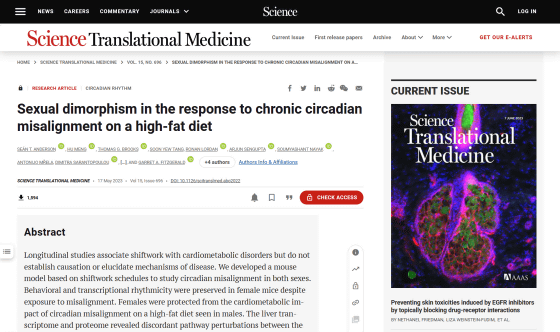Research results that women are less likely to become metabolic syndrome even if their body clock is disturbed at night shift than men

The human body is regulated by a body clock (circadian rhythm) that has a cycle of about one day, but if the sleep cycle is disturbed by staying up all night or working shifts, the circadian rhythm will be disrupted and various adverse effects will occur on the mind and body. I know that. A new study showed that ``women have a higher ability to recover from circadian rhythm disturbances than men''.
Sexual dimorphism in the response to chronic circadian misalignment on a high-fat diet | Science Translational Medicine
https://doi.org/10.1126/scitranslmed.abo2022

Women appear to be more resilient to body clock disruptions than men – new research
https://theconversation.com/women-appear-to-be-more-resilient-to-body-clock-disruptions-than-men-new-research-205713
There are many factors that can disrupt human circadian rhythms, but one of the most common is shift work, where day and night shifts alternate regularly. Nurses, police officers, factory workers, 24-hour restaurant workers, and other people who live mixed day and night shifts are forced to be awake when their circadian rhythms dictate sleep. On the contrary, you must go to sleep when your circadian rhythm is telling you to wake up.
However, past research suggests that people who continue to live against this circadian rhythm are more likely to have health risks such as metabolic syndrome, which is a combination of symptoms such as high blood sugar and high blood pressure in obesity. It has been. Metabolic syndrome is a serious public health problem as it increases the risk of diabetes, heart disease and stroke.

Therefore, a research team at the University of Pennsylvania, USA, manipulated the environment of mice to disrupt the night-day cycle in the same way as humans who work shifts, and how disruption of circadian rhythms affects male and female mice. I checked to see if it would affect me.
Experiments have shown that female mice are more resilient to circadian rhythm disruptions than male mice, and that high-fat diets have less cardiometabolic effects. Male mice had difficulty adapting to circadian rhythm disruptions, resulting in inconsistent time spent exercising on the wheel.
The research team analyzed not only activity in mice, but also effects on
Furthermore, when examining the intestinal bacteria of mice, it was also found that male mice had a significant increase in certain bacteria commonly found in human diabetic patients. On the other hand, it has also been reported that the intestinal bacteria in female mice did not change much despite the disturbance of the circadian rhythm. A whole body of research suggests that female mice are more resilient to circadian rhythm disruptions than male mice.

Of course, there are many differences between mouse and human bodies, so mouse research results cannot be directly transferred to humans. Therefore, the research team focused on
The analysis showed that both men and women who worked shifts had a higher incidence of metabolic syndrome, but again, female shift workers had a significantly lower incidence of metabolic syndrome compared to men. rice field. In other words, it was suggested that women are more resilient to circadian rhythm disturbances than men, even in humans, and may reduce the harmful effects to some extent.

The findings aren't just relevant for shift workers, they have important implications for everyone. For example, social jet lag, such as 'I'm having a hard time getting up on Monday morning because I stayed up late on a holiday', is also a type of circadian rhythm disruption that can adversely affect people's health as it accumulates.
The fact that women may be more susceptible to circadian rhythm disruption than men reinforces the finding that men are more susceptible to diabetes and hypertension as a result of shift work. This could lead to better strategies to mitigate the negative effects of circadian rhythm disruption, such as designing healthy shift work schedules.
Related Posts:
in Science, Posted by log1h_ik







